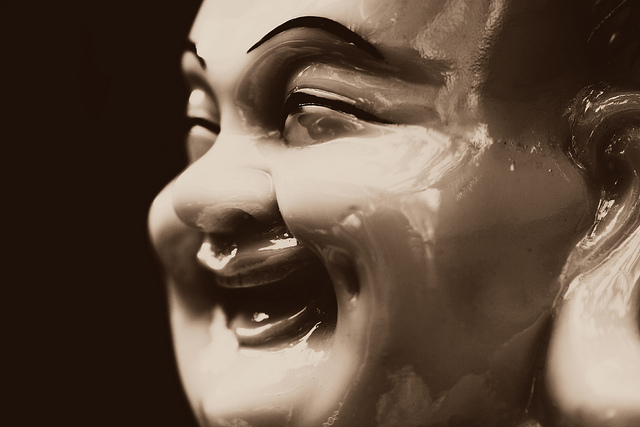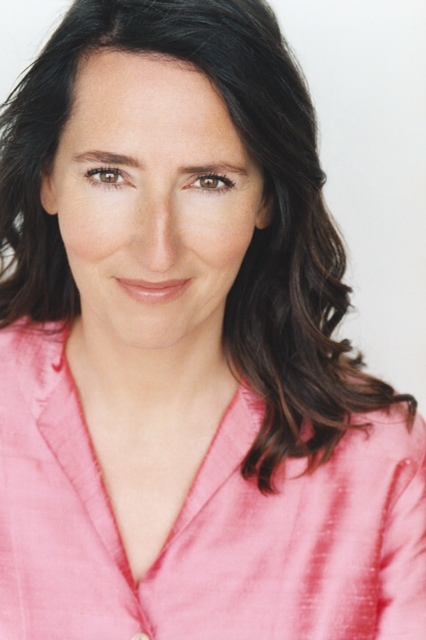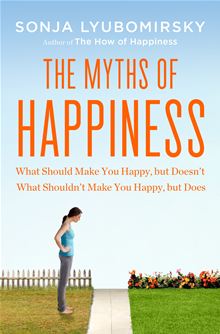
In Squaring Off, Zócalo invites authors into the public square to answer five questions about the essence of their books. For this round, we pose questions to UC Riverside psychologist Sonja Lyubomirsky, author of The Myths of Happiness: What Should Make You Happy, But Doesn’t, What Shouldn’t Make You Happy, But Does.
Lyubomirsky argues that we’ve been fed a series of destructive “happiness myths” that prevent us from ever feeling truly content. We’re taught, for example, that certain life achievements—marriage, parenthood, a “dream” job—will generate everlasting pleasure, while others—illness, divorce, aging—will render us incapable of joy. She says that by being aware of these myths—and the biological reason that nothing can truly create permanent ecstasy—or melancholy—we can begin to lead happier, healthier lives.


-
You kick off your book by challenging Malcolm Gladwell’s thesis in Blink. He argues that decisions based on gut instinct are more accurate than those based on reasoned analysis. In crisis situations, however, you argue that we must “think, not blink,” or mistrust our first reactions in favor of the second or third ones. But can you point to any situations in which our first thoughts can be an accurate or useful guide?
The reason for my argument is that our immediate intuitions (e.g., “My life will be over if I get divorced” or “I can’t be happy until I get that job”) are commonly influenced by culturally transmitted biases and preconceptions. What I set out to do in my book is to describe how and why we are often so wrong with these “first thoughts” about what will make us happy and unhappy. However, by no means does this mean that we should never make judgments or decisions based on intuition or emotion. My argument is that when facing a major life transition, there is great value to waiting and thinking. But many daily judgments and decisions (e.g., “Do I like this new colleague?” or “Is this work of art a fake?”) will be more accurate when based on gut instincts and feelings. -
Are the happiness myths we carry with us a modern cultural invention, or do they have ancient roots? And do all people suffer from them, or is there a particular demographic that’s disproportionately impacted?
My best guess is that these myths are culturally transmitted. Countless messages communicated by the media, the books we read, our parents, and our neighbors tell us that we must find passionate love and a dream job to be happy (and that they should last forever), that our dreams must come true, and that we should dread singlehood, illness, and aging. Versions of such messages are likely prevalent in many cultures, but they are particularly strong in Western nations. I believe that all of us—no matter our ethnicity, gender, age, or income level—fall prey to them. -
You write a lot about the concept of hedonic adaptation, which is humanity’s ability to adapt to nearly any situation, positive or negative, over time. As a result, new jobs and relationships lose their luster, and the wounds of a crisis or disappointment heal. You argue that it’s possible to combat the effects of this, but how much can we really overcome a state of being that’s so evolutionarily engrained?
The phenomenon of hedonic adaptation is indeed a very natural, human, and evolutionarily adaptive process. If our emotional reactions to both positive and negative events did not weaken over time, we would have difficulty staying vigilant to threats and rewards within our environments (e.g., an opportunity for a new relationship or the danger of a snake underfoot). Furthermore, as one case in point, if we did not adapt to passionate love, we might become overwhelmed by our emotions and not be able to focus on other important responsibilities. However, some scientists argue that such feelings and urges as violence, greed, and gluttony are also natural, but that does not mean that human beings cannot overcome them. Research shows that we can indeed thwart or slow down hedonic adaptation, but doing so requires effort and persistence. Three keys to successfully accomplishing this are 1) appreciation (remembering to think about and express gratitude for what we have); 2) variety (preventing our jobs or relationships from becoming too familiar by varying our activities each week); and 3) surprise (opening ourselves up to new opportunities and challenges, such as meeting new people, learning new skills, or traveling to new places). -
Is our notion of “settling”—staying in a situation or relationship that we perceive to be somehow inferior, but safe—merely a side effect of hedonic adaptation? Is that also a myth we need to rethink or discard?
I believe that sometimes “settling” reflects the recognition that we have adapted to a particular life circumstance, and sometimes it reflects a regrettable lowering of standards. What we need is the wisdom to know the difference! The truth is that hedonic adaptation is very powerful. When we begin a new relationship, for example, we often feel intense emotions—love, passion, even obsession. But, in healthy relationships, this intensity can never last for very long. So when the passion subsides, and the novel partner becomes all too familiar and perhaps even “boring” at times, does this mean that we are settling by staying with them? Messages transmitted by our culture—movies, novels, poetry—tell us that we should only marry when we are deeply and intensely in love. But those cultural messages rarely guide us through the effortful and often challenging process of maintaining a long-term partnership. If the intensity has slowly faded, then the fault is probably not yours or your partner’s, but that of hedonic adaptation. But if love has disappeared completely or your partner has qualities that you cannot abide with, then perhaps to stay would be unwise. -
Do you ever fall for the happiness myths?
I absolutely do! The problem with happiness myths is that they are deeply ingrained in our culture. This means it takes a lot of effort and a sort of “cognitive retraining” to remind ourselves not to fall for them. It’s a bit like knowing that an illustration depicts a visual illusion but still succumbing to it. A good example is aging. I am quite familiar with all the research about the wisdom and well-being that comes with advanced age, yet I still cannot help but dread it. On the upside, this experience has made it easier for me to write and discuss The Myths of Happiness, as I can relate very well to how most people, at least in the U.S., think about what will bring them great happiness or great misery in the future.



